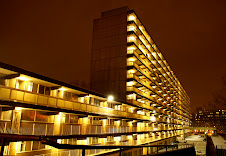Included is an interview with one of the last 11 residents: Adrian Glasspool who bought his flat on the Estate in 1997. Mr. Glasspool argues that: "
a tightly knit community, with many residents who had been here from the beginning in 1974, has been destroyed and scattered to distant parts of the borough. He says one elderly woman, long decanted, still comes back to walk her dog.
Glasspool calls the destruction of the Heygate an example of "environmental determinism". "It's part of the same discourse that was being bandied around in the 1960s," he argues. "Then it was said that the tenement buildings needed to be demolished because they didn't create an environment where people could live happily. It was precisely what is being said now." He believes the idea that the estate was "blighted" by crime and drugs was part invention – the product of an excitable media and of film-makers who liked to use the Heygate as a set for gritty realist dramas – and part self-fulfilling prophecy, as the council neglected maintenance and replaced long-term tenants with short-term licensees, who tended to be more disruptive.
From another of the remaining residents:
"It's been a long road," A cold one, too: the communal heating system has ceased to work, and he is reduced to warming his flat with small convector heaters. "But the harder things get, the more determined you become." Like Glasspool, he doesn't understand why the estate had to go. "There are a lot of bright, enthusiastic, imaginative architectural students who could do something amazing with it – a coat of paint, lighting. And there must be professional architects who would be interested in it as a social project. But it's not about that; it's all about the gentrification of the area. They've chosen to knock this estate down because it's in a prime location."
Also interviewed is Tim Tinker, the estate's architect, who visits the almost abandoned estate after an absence of ten years:
"I don't think it was in any sense a failed estate," he tells me as we survey his decayed handiwork. "There are failed estates, but this wasn't one of them. The hardware – what we provided in concrete and brick – was relatively OK. The problem was there wasn't the software to run the damn thing. There was a huge influx of new housing [in the 60s and early 70s], and management never really understood what they had."
Tinker also believes the council wants to knock the Heygate down because of its central location. "There weren't any problems [with the estate] until relatively recently, but the council eyed it as an opportunity. Councils always go for big-bang, new-build solutions, as opposed to looking after what they've got. Now, sometimes big-bang solutions are right, but quite often they're not and the net gain is limited."
For someone whose principal architectural legacy is about to be knocked down, the 75-year-old Tinker is remarkably philosophical.
"It's the past," he says. "People buying their houses wasn't an issue then. The idea in those days was that local authority housing should be for all. It wasn't only for the people who'd fallen under Mr Cameron's 'big society'. There was a clear feeling that local authority housing should avoid that stigma."
Tinker adds:
"Utopian is a dangerous word . . . but if you're working in local-authority housing you're bound to have a utopian view. What's the point of doing it otherwise? You look back now and ask why people were enamoured with modern architecture, and I would suggest it was to do with light, sunlight. At that time these inner-city areas were extremely nasty, smoky, dirty places. The Elephant was still pretty bad, with tanneries and God knows what else." The flats he designed were light and airy, and the now despised walkways were created to keep people away from cars, which back in the late 60s when the estate was planned were just on the point of becoming ubiquitous.
He says the early tenants responded to those utopian intentions. "I used to go into the flats for the regular defects inspections," he recalls, "and it was always interesting to see what people had done to their flats or maisonettes. People did amazing things inside."
The last word goes to Dickson Powers, former housing director of Peabody Trust:
"It's ridiculously expensive to knock estates down, After they've knocked them down, they're still paying for them. They were all built on the basis of a 60-year payback period. These are not dysfunctional buildings. If you invest in them, they will be perfectly fine. There's been this vogue recently for this kind of approach, which says, 'This is an awful estate, we give up, we can't manage it, what we're going to do is knock it down, redevelop it at three times the density and fill it up with owner-occupiers who will be a good example to these feckless local authority tenants.'"
He finds the approach naive as well as patronising, because many of the flats are bought not by owner-occupiers but by investment companies on a buy-to-let basis, and their tenants often lead even more chaotic lives than people in social housing.
Like Power, he favours a more flexible approach. "It's unsustainable to build such robust and structurally sound properties, and then take them away after 30 or 40 years. We have to build on a much longer cycle, and if necessary we have to be prepared to allow the people in those buildings to change. Let them evolve. If you have the right kind of buildings, uses can swill backwards and forwards. Supposing someone wanted to convert part of the Heygate estate into office suites; great, let's do it. It's the organic city, as opposed to the tidy-minded planned city that says, 'You were once social housing, so you will always be social housing.'"







4 comments:
its may be good for someone
Buying house in london with affordable price
Dear Tim,
Here is a photographic series on The Heygate Estate.
It was exhibited in London late last year.
http://simonkennedy.net/Heygate%20abstracted%20Part1.html
"Like Power, he favours a more flexible approach."
There's something odd about that line because I cannot see a reference elsewhere to Anne Power, formerly of the LSE, nor from Alan Powers, of the C20th Society so to whom is Dickson referring?
PB
You've got your people badly mixed up. Dickon Robinson was a past Director of Development at the Peabody Trust, Anne Power was at the LSE and Alan Powers is a former chairman of the C20th Society. Now to whom are you referring?
PB
Post a Comment